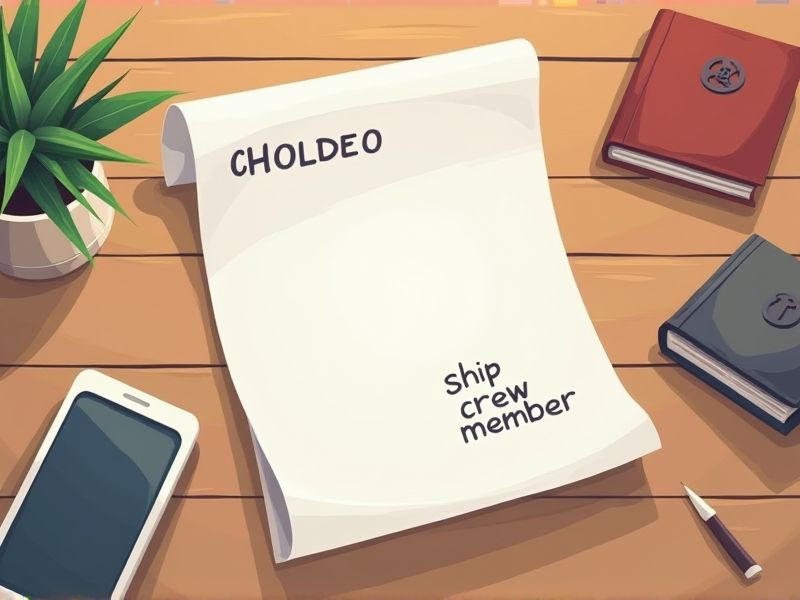
The maritime industry requires ship crew members to possess certain certifications to ensure safety and efficiency at sea. These certifications verify that crew members have the necessary skills to handle various onboard duties and potential emergencies. Compliance with international maritime regulations also mandates specific qualifications for all crew members. Important certifications you may need for a ship crew member include safety, medical, and technical training.
STCW Basic Safety Training
STCW Basic Safety Training ensures ship crew members are prepared for emergencies, reducing accidents and saving lives. International maritime regulations mandate STCW compliance, standardizing safety protocols across global waters. Comprehensive training encompasses firefighting, first aid, and survival skills, equipping crew for diverse maritime challenges. By fostering a culture of safety, STCW training enhances operational efficiency and crew welfare on board.
Advanced Fire Fighting
Advanced Fire Fighting is necessary for ship crew members because ships are enclosed environments where fires can spread rapidly, creating confined and hazardous situations. Proper training equips crew members to efficiently control and extinguish fires, minimizing potential damage and ensuring the safety of all aboard. The presence of flammable materials and machinery on ships increases the risk of fires, necessitating specialized skills to handle such emergencies effectively. Without comprehensive training, the response time to a fire incident could be longer, leading to potential loss of life or severe property damage.
Proficiency in Survival Craft and Rescue Boats
Proficiency in Survival Craft and Rescue Boats equips ship crew members with the skills necessary to effectively deploy lifeboats and other emergency equipment, enhancing survival during maritime emergencies. Training prepares crew for the wide range of potential scenarios and weather conditions that can occur at sea, ensuring quick, decisive action. Effective handling of rescue boats minimizes risk of injury or further accidents when evacuating a vessel. Regulatory bodies, such as the International Maritime Organization, mandate this proficiency to uphold safety standards in the shipping industry.
Medical First Aid and CPR
Ship crew members are often isolated at sea, with limited access to immediate professional medical assistance, making medical first aid and CPR critical in managing onboard emergencies. The hazards of maritime work, such as falls, equipment-related injuries, and sudden health issues, increase the likelihood of accidents, necessitating prompt intervention to prevent worsening conditions. Training in these skills enables crew members to stabilize injured or ill colleagues, mitigating potential life-threatening situations until professional help arrives or the ship reaches port. Regulatory standards often mandate such training to ensure safety compliance and preparedness, fostering a safer maritime environment for all aboard.
GMDSS Radio Operator Certificate
Possessing a GMDSS Radio Operator Certificate ensures that the crew member can efficiently manage maritime distress and safety systems. The certificate verifies their ability to operate advanced communication equipment on board, which is essential for maintaining effective communication during emergencies. Compliance with international regulations, such as SOLAS, mandates certified personnel for maintaining valid ship certifications. Proficient communication management can significantly reduce response time in critical situations, enhancing overall ship safety.
Ship Security Officer Training
Ship Security Officer Training is essential for crew members because it equips them with knowledge to identify and respond to potential security threats, such as piracy or terrorism. Training enhances communication and coordination skills, which are crucial during emergencies. Understanding international maritime security protocols ensures compliance with regulations like the ISPS Code. This training mitigates risks and protects both the crew and cargo, ensuring safe passage.
Crowd Management
Increased passenger numbers on ships lead to greater risk of incidents, making crowd management essential for safety. Proper training in crowd management allows crew members to efficiently handle emergencies like evacuations. Managing large groups effectively minimizes chaos and potential injuries during high-pressure situations. Compliance with international maritime regulations requires crew members to possess crowd management skills.
Bridge Resource Management
Bridge Resource Management (BRM) enhances communication and teamwork among crew members, reducing the risk of human error. Improved situational awareness is a direct result, leading to timely decision-making during critical scenarios. Consistent training in BRM practices increases operational efficiency, optimizing vessel performance. Emphasizing resource allocation ensures effective use of all available assets, enhancing safety on board.
Engine Room Resource Management
Engine Room Resource Management (ERRM) is essential because it enhances communication and teamwork among crew members, reducing the likelihood of errors. Effective ERRM training ensures that crew can manage high-pressure situations, leading to improved safety standards onboard. Implementing ERRM also optimizes operational efficiency, resulting in reduced fuel consumption and maintenance costs. The focus on human factors in ERRM fosters a culture of continuous learning and adaptability within the crew.
Maritime English Certification
Maritime English Certification ensures that ship crew members can communicate effectively, minimizing the risk of misunderstandings that could lead to accidents or inefficiencies. The International Maritime Organization mandates a common language to enhance safety and efficiency in international waters. Miscommunication often results in operational errors, so having certified proficiency in Maritime English helps bridge language barriers. The certification acts as a standardized proof of linguistic competence, meeting both legal and industry requirements.
Summary
When you ensure your ship crew members obtain certifications, you enhance their expertise and professionalism. This leads to improved safety protocols and operational efficiency on board. Certified crew members gain specialized skills, reducing the likelihood of maritime incidents. Companies also benefit from reduced insurance premiums and increased trust from clients.
